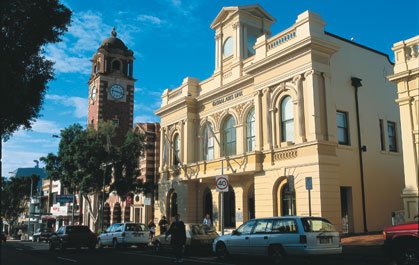
Ipswich, Queensland, Australia (Smart21 2011, 2012, 2015, 2016, 2017 and Top7 2015, 2017)
In 2011, the city of Ipswich published a 20-year economic development plan for its population of 195,000. It forecast the addition of 292,000 new residents, who will require an additional 120,000 jobs, and will live in a network of distinct communities interwoven with centers of employment, recreational facilities and green space. The plan responded to future challenges but also to past ones.
Because Ipswich offered affordable housing and an attractive lifestyle, its population has grown rapidly in the booming economy of 21st Century Australia. Yet the decline of industrial employment in the 70s and 80s had left the city with legacy of long-term unemployment and bred unacceptable levels of crime and social dislocation.
Ipswich has been quick to seize multiple opportunities in carrying out the plan. The Australian government’s National Broadband Network (NBN), announced in 2009, opened the possibility of attracting significant investment into the region. Ipswich City Council partnered with surrounding city and regional councils to build a case for NBN rollout of what it termed the Western Corridor National Broadband Network. The governments mapped current and proposed broadband infrastructure, developed joint policies and solicited support from business and industry groups. Their work was rewarded in 2010, when NBN announced that two locations in the region would receive the first deployments of fiber to the premise. Since then, NBN has rolled out Fiber-to-the-Premise (FTTP) network infrastructure for nearly 32,000 premises in Ipswich.
A similar strategy has driven 3G and 4G mobile deployment. Governments combined to conduct independent testing of availability throughout the region, which sent testing vehicles across more than 2,300 kilometers of roads. The effort paid off by letting governments bring objective data to their negotiations with carriers about where towers should go to provide the broadest possible coverage. But Ipswich has been as ready to partner with the private sector as to pressure it. Acting as intermediary, Ipswich has coordinated between property developers and NBN to direct NBN investment in conduit to areas where property developers or the city are launching construction, which saves all parties time and money. The Ipswich City Council has simultaneously worked to raise awareness of the NBN deployment within the community by facilitating community education sessions on the NBN rollout, providing presentations to City Stakeholder Groups about the benefits of NBN and adding NBN construction impacts and rollout timings to Council e-newsletters, social media posts and advertisements.
Ipswich faces an unusual growth situation, having both the fastest growing population in Queensland and the youngest on average. This has put pressure on the City Council to ensure many new jobs are available when its young citizens join the workforce. Enter Fire Station 101.
Fire Station 101 is a hub for startups and innovators that provides education, mentoring and even potential funding. The hub has been open since March 2016 as a place where entrepreneurs come to build new ideas around digital technology. By raising the profile of entrepreneurship and innovation in the community, Ipswich aims to foster economic diversification while developing a skilled, knowledge-based workforce and jobs. And it’s working. Fire Station 101 gained 50 member startups in its first six months of operation.
Building on its first twenty-year plan, the Ipswich City Council has created the Smart City Blueprint and Implementation Plan project. The project has adopted a human-centered design approach, focusing on the needs of citizens, local entrepreneurs, city workers and even tourists. The Smart City Blueprint has three core goals: jobs, growth, and livability for Ipswich.
To meet the goal of jobs, the Council has extended Fire Station 101’s reach into researching civic challenges in partnership with local industry and universities. Ipswich has also created a Digital Skills Literacy program for all Ipswich residents, working with schools and adults in the community. Finally, the Council will host the Build and Learn Fair, an event that encourages residents and visitors to build and showcase creations like robots and wood works. This event aims to give residents a hands-on experience of the new possibilities available in the Ipswich jobs market.
The City Council has adopted multiple green initiatives to help Ipswich sustain its current and future growth. These initiatives include Eco-Village Micro, a grid program with solar energy, batteries and energy trading technologies currently in development, and also a smart lighting program for the city with LEDs, sensors and data analytics for maximum efficiency. The Council is investigating converting some of its fleet to electric vehicles and is in the trials phase of autonomous public transport for the city.
To enhance the livability of Ipswich as a city, the Council has adopted the Safe Precinct initiative: leveraging its city network to create a safe precinct via video analytics, smart lighting and noise detection. The Council has also helped to develop a healthy living lab with wearables and other technologies designed to capture real-time data about the health and activity of residents in order to better meet their needs. Perhaps most importantly of all, the Ipswich City Council has created new platforms for delivering its services online, making it easier for citizens to learn about and utilize all the city has to offer.
As of 2015, Ipswich has commenced a major redevelopment of its city center, where digital technologies will be used to attract commercial and residential tenants and to improve public safety through video monitoring, license plate and facial recognition software. Green standards will make the city center one of the most sustainable in Australia. When it is completed in 2031, it will mark the emergence of one of the nation’s model cities.
To learn more see: Website: www.ipswich.qld.gov.au
![]()
![]()
Want to have a voice in iCommunity.ca, the official newsletter of ICF Canada? Please send your blogs, announcements and other interesting content to John G. Jung at [email protected]

ICF Canada 1310-20 Bay Street Toronto, Ontario M5J 2N8 www.icf-canada.com
Contact: John G. Jung at [email protected] 1-647-801-4238 cell
Want to change how you receive these emails?
You can update your preferences or unsubscribe from this list
